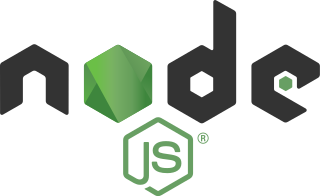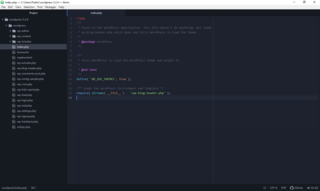In computing, the utility diff is a data comparison tool that computes and displays the differences between the contents of files. Unlike edit distance notions used for other purposes, diff is line-oriented rather than character-oriented, but it is like Levenshtein distance in that it tries to determine the smallest set of deletions and insertions to create one file from the other. The utility displays the changes in one of several standard formats, such that both humans or computers can parse the changes, and use them for patching.
Minification is the process of removing all unnecessary characters from the source code of interpreted programming languages or markup languages without changing its functionality. These unnecessary characters usually include white space characters, new line characters, comments, and sometimes block delimiters, which are used to add readability to the code but are not required for it to execute. Minification reduces the size of the source code, making its transmission over a network more efficient. In programmer culture, aiming at extremely minified source code is the purpose of recreational code golf competitions.
LXR Cross Referencer, usually known as LXR, is a general-purpose source code indexer and cross-referencer for code comprehension that provides web-based browsing of source code, with links to the definition and usage of any identifier.

The Yahoo! User Interface Library (YUI) is a discontinued open-source JavaScript library for building richly interactive web applications using techniques such as Ajax, DHTML, and DOM scripting. YUI includes several core CSS resources. It is available under a BSD License. Development on YUI began in 2005 and Yahoo! properties such as My Yahoo! and the Yahoo! front page began using YUI in the summer of that year. YUI was released for public use in February 2006. It was actively developed by a core team of Yahoo! engineers.
TypeScript is a free and open-source high-level programming language developed by Microsoft that adds static typing with optional type annotations to JavaScript. It is designed for the development of large applications and transpiles to JavaScript. Because TypeScript is a superset of JavaScript, all JavaScript programs are syntactically valid TypeScript, but they can fail to type-check for safety reasons.
JSDoc is a markup language used to annotate JavaScript source code files. Using comments containing JSDoc, programmers can add documentation describing the application programming interface of the code they're creating. This is then processed, by various tools, to produce documentation in accessible formats like HTML and Rich Text Format. The JSDoc specification is released under CC BY-SA 3.0, while its companion documentation generator and parser library is free software under the Apache License 2.0.

Google Closure Tools is a set of tools to help developers build rich web applications with JavaScript. It was developed by Google for use in their web applications such as Gmail, Google Docs and Google Maps. As of 2023, the project had over 230K LOCs not counting the embedded Mozilla Rhino compiler.

Node.js is a cross-platform, open-source JavaScript runtime environment that can run on Windows, Linux, Unix, macOS, and more. Node.js runs on the V8 JavaScript engine, and executes JavaScript code outside a web browser.

npm is a package manager for the JavaScript programming language maintained by npm, Inc. npm is the default package manager for the JavaScript runtime environment Node.js and is included as a recommended feature in the Node.js installer.

Amber Smalltalk, formerly named Jtalk, is an implementation of the programming language Smalltalk-80, that runs on the JavaScript runtime of a web browser. It is designed to enable client-side development using Smalltalk. The programming environment in Amber is named Helios.

Brackets is a source code editor with a primary focus on web development. Created by Adobe Inc., it is free and open-source software licensed under the MIT License, and is currently maintained on GitHub by open-source developers. It is written in JavaScript, HTML and CSS. Brackets is cross-platform, available for macOS, Windows, and most Linux distributions. The main purpose of Brackets is its live HTML, CSS and JavaScript editing functionality.

GraalVM is a Java Development Kit (JDK), written in Java. The open-source distribution of GraalVM is based on OpenJDK, and the enterprise distribution is based on Oracle JDK. As well as just-in-time (JIT) compilation, GraalVM can compile a Java application ahead-of-time so that it starts instantly, provides peak performance with no warmup, and uses fewer resources. It provides additional programming languages and execution modes. The first production-ready release, GraalVM 19.0, was distributed in May 2019. The most recent release is GraalVM for JDK 21, made available in September 2023.

Atom was a free and open-source text and source code editor for macOS, Linux, and Windows with support for plug-ins written in JavaScript, and embedded Git Control. Developed by GitHub, Atom was released on June 25, 2015.
ContentTools is an open-source WYSIWYG editor for HTML content written in JavaScript/CoffeeScript by Anthony Blackshaw of Getme Limited.

Vue.js is an open-source model–view–viewmodel front end JavaScript library for building user interfaces and single-page applications. It was created by Evan You, and is maintained by him and the rest of the active core team members.
gulp is an open-source JavaScript toolkit, used as a streaming build system in front-end web development.

PostCSS is a software development tool that uses JavaScript-based plugins to automate routine CSS operations. It was designed by Andrey Sitnik with the idea taking its origin in his front-end work for Evil Martians.
JSDelivr is a public content delivery network (CDN) for open-source software projects, including packages hosted on GitHub, npm, and WordPress.org. JSDelivr was created by developer Dmitriy Akulov.
Next.js is an open-source web development framework created by the private company Vercel providing React-based web applications with server-side rendering and static website generation.

Deno is a runtime for JavaScript, TypeScript, and WebAssembly that is based on the V8 JavaScript engine and the Rust programming language. Deno was co-created by Ryan Dahl, who also created Node.js.









